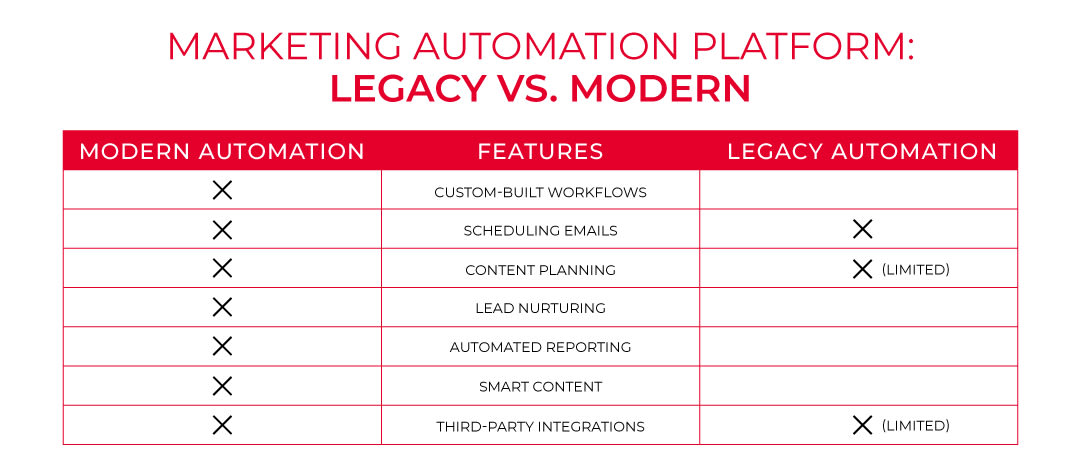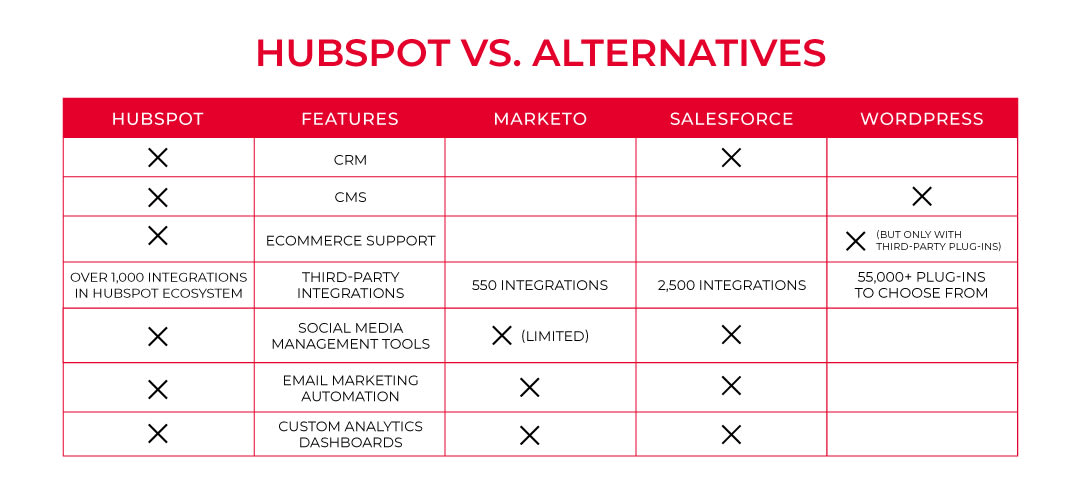Have you noticed your marketing tools (CMS, CRM, social media management tool, email marketing platform, etc.) become obsolete before your very eyes? Maybe it’s missing key features or maybe it’s just that you can’t execute the ideas and strategies you want to. Either way, these are telltale signs that your chosen legacy system has become inadequate and it’s holding you back.
Modern digital marketing platforms, like HubSpot and HubSpot alternatives, have all of these tools and the newest, most innovative features available to marketers today.
Is it time to make the switch to a more modern solution? Which one is right for me, anyways? In this guide, we’ll find out answers to all your questions and set you on a path toward a more effective digital marketing future.
Legacy vs. Modern Marketing Systems
When deciding whether or not you need to upgrade from your old, outdated legacy marketing system, you must consider what you really need to do the best marketing that you can do. Does your current system have everything that modern marketers need to compete? What is it keeping you from being able to do?
When it comes to must-have features, a modern marketing tool has to bring a lot to the table to compete with the best of the best (HubSpot, Salesforce, etc.). Here are some key features found in most modern marketing systems that you should be looking for in a new system (and which are probably absent from your current one):
Must-Have Features for Modern Marketers
- Automation (Workflows, emails, social media, CRM, etc.)
- Social media management
- Content management system (CMS)
- Reporting and analytics
- Paid ad tracking and management
- Custom dashboards
- List segmentation
- CRM and contact management
- Custom-built website pages
- A/B testing
Compared to legacy counterparts, modern systems bring a plethora of new tools that unlock even more potential in research, automation, data-driven decision making, and audience engagement than ever before.
When Should you Upgrade from a Legacy System?
The big question on many business’ minds is: how do I know when I should upgrade from my legacy system?
This is not an easy question to answer, let alone ask yourself when things are seemingly going along well. Sometimes you don’t even know what you don’t have because some of the newest and most innovative features available on modern systems are things you wouldn’t have even considered in the past.
For example, automation used to be something you could use to schedule a newsletter or post a blog first thing in the morning, now it has its hands in a little bit of everything and can be used to completely streamline and overhaul your marketing processes from top to bottom.
Here are some of the things to keep an eye out for as signs that you should consider upgrading from your older legacy system:
- You’re restricted to a single channel or you’re forced to use multiple systems to manage omnichannel campaigns
- Your current CMS, CRM, or other marketing system is too slow
- You can’t integrate new tools or software with your current system
- Repetitive, manual work is necessary and takes up too much time
- Your current system is no longer being supported or updated by the developer
- You’re aware of missing features or tools that you currently don’t have access to
If you’re noticing any of these signs or can confidently agree with them after reading, then the time to consider a jump to a more modern marketing system is definitely now.
In the case of HubSpot and its abundance of digital marketing tools, they can be split up into a few subsets of features, including a CRM, a CMS, a marketing automation platform, email marketing tools, and social media management. Below, you’ll find each stacked up against its legacy counterpart, comparing key features and showing what’s missing for businesses that choose to stick with their out-of-date legacy systems.
Legacy vs. Modern CRM
Modern businesses need ways to manage the many contacts they acquire through digital marketing efforts. In modern marketing, this is done through a CRM that can automate data entry, help manage contacts, create reports, and more that legacy systems just can’t do.







